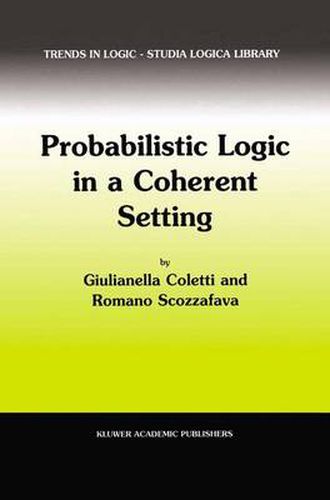Readings Newsletter
Become a Readings Member to make your shopping experience even easier.
Sign in or sign up for free!
You’re not far away from qualifying for FREE standard shipping within Australia
You’ve qualified for FREE standard shipping within Australia
The cart is loading…






This title is printed to order. This book may have been self-published. If so, we cannot guarantee the quality of the content. In the main most books will have gone through the editing process however some may not. We therefore suggest that you be aware of this before ordering this book. If in doubt check either the author or publisher’s details as we are unable to accept any returns unless they are faulty. Please contact us if you have any questions.
The approach to probability theory followed in this book (which differs radically from the usual one, based on a measure-theoretic framework) characterizes probability as a linear operator rather than as a measure, and is based on the concept of coherence, which can be framed in the most general view of conditional probability. It is a ‘flexible’ and unifying tool suited for handling, e.g., partial probability assessments (not requiring that the set of all possible ‘outcomes’ be endowed with a previously given algebraic structure, such as a Boolean algebra), and conditional independence, in a way that avoids all the inconsistencies related to logical dependence (so that a theory referring to graphical models more general than those usually considered in bayesian networks can be derived). Moreover, it is possible to encompass other approaches to uncertain reasoning, such as fuzziness, possibility functions, and default reasoning. The book is kept self-contained, provided the reader is familiar with the elementary aspects of propositional calculus, linear algebra, and analysis.
$9.00 standard shipping within Australia
FREE standard shipping within Australia for orders over $100.00
Express & International shipping calculated at checkout
This title is printed to order. This book may have been self-published. If so, we cannot guarantee the quality of the content. In the main most books will have gone through the editing process however some may not. We therefore suggest that you be aware of this before ordering this book. If in doubt check either the author or publisher’s details as we are unable to accept any returns unless they are faulty. Please contact us if you have any questions.
The approach to probability theory followed in this book (which differs radically from the usual one, based on a measure-theoretic framework) characterizes probability as a linear operator rather than as a measure, and is based on the concept of coherence, which can be framed in the most general view of conditional probability. It is a ‘flexible’ and unifying tool suited for handling, e.g., partial probability assessments (not requiring that the set of all possible ‘outcomes’ be endowed with a previously given algebraic structure, such as a Boolean algebra), and conditional independence, in a way that avoids all the inconsistencies related to logical dependence (so that a theory referring to graphical models more general than those usually considered in bayesian networks can be derived). Moreover, it is possible to encompass other approaches to uncertain reasoning, such as fuzziness, possibility functions, and default reasoning. The book is kept self-contained, provided the reader is familiar with the elementary aspects of propositional calculus, linear algebra, and analysis.